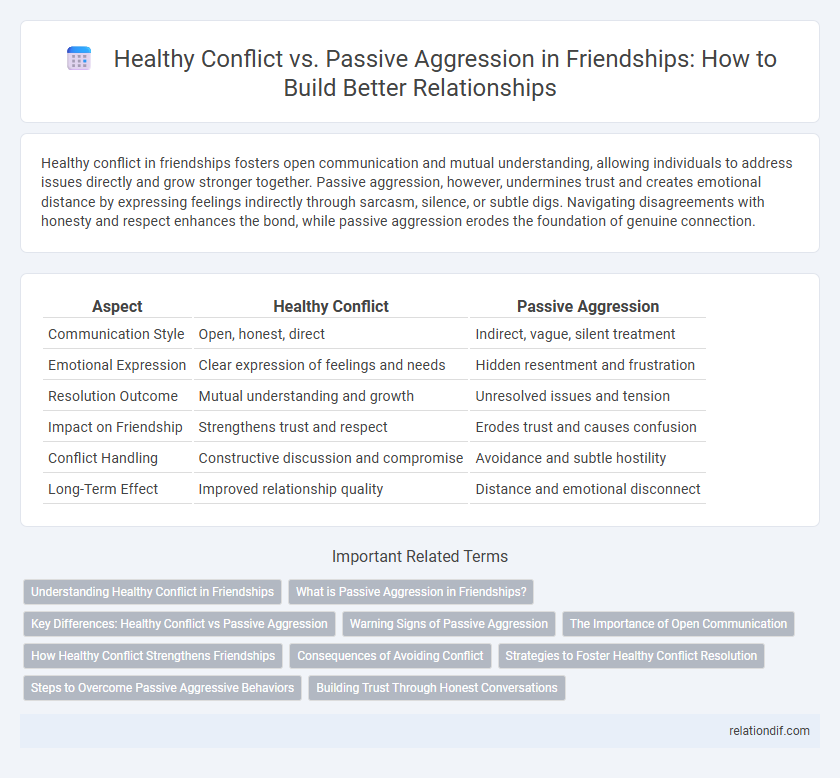Healthy conflict in friendships fosters open communication and mutual understanding, allowing individuals to address issues directly and grow stronger together. Passive aggression, however, undermines trust and creates emotional distance by expressing feelings indirectly through sarcasm, silence, or subtle digs. Navigating disagreements with honesty and respect enhances the bond, while passive aggression erodes the foundation of genuine connection.
Table of Comparison
| Aspect | Healthy Conflict | Passive Aggression |
|---|---|---|
| Communication Style | Open, honest, direct | Indirect, vague, silent treatment |
| Emotional Expression | Clear expression of feelings and needs | Hidden resentment and frustration |
| Resolution Outcome | Mutual understanding and growth | Unresolved issues and tension |
| Impact on Friendship | Strengthens trust and respect | Erodes trust and causes confusion |
| Conflict Handling | Constructive discussion and compromise | Avoidance and subtle hostility |
| Long-Term Effect | Improved relationship quality | Distance and emotional disconnect |
Understanding Healthy Conflict in Friendships
Healthy conflict in friendships involves open communication, mutual respect, and active listening, allowing both parties to express feelings without fear of judgment. It fosters trust and strengthens bonds by addressing misunderstandings or disagreements constructively. Recognizing and resolving conflicts healthily prevents resentment and promotes emotional growth within the relationship.
What is Passive Aggression in Friendships?
Passive aggression in friendships manifests as indirect expressions of anger or resentment, such as silent treatment, sarcasm, or subtle sabotage. This behavior undermines trust and communication, making conflicts harder to resolve and damaging the emotional connection. Recognizing passive aggression early helps promote healthier, more honest interactions between friends.
Key Differences: Healthy Conflict vs Passive Aggression
Healthy conflict in friendship involves open communication, mutual respect, and a focus on resolving differences to strengthen the relationship, while passive aggression is characterized by indirect expressions of anger, such as sarcasm, avoidance, or silent treatment, which erode trust and create emotional distance. In healthy conflict, both parties openly address issues and listen actively, leading to improved understanding and connection, whereas passive aggression fosters misunderstanding and resentment by masking true feelings. Recognizing these key differences is essential for maintaining authentic, supportive, and long-lasting friendships.
Warning Signs of Passive Aggression
Warning signs of passive aggression in friendship include indirect communication, such as giving the silent treatment or making sarcastic remarks instead of expressing true feelings openly. Friends may demonstrate inconsistency in behavior, showing affection at times while subtly undermining or withholding support during conflicts. This toxic pattern often leads to unresolved issues, emotional distance, and the gradual erosion of trust in the relationship.
The Importance of Open Communication
Open communication in friendship fosters trust and prevents misunderstandings by encouraging honest expression of feelings and concerns. Addressing conflicts directly reduces the risk of passive aggression, which can erode relationships over time. Prioritizing transparent dialogue strengthens emotional bonds and promotes long-term friendship resilience.
How Healthy Conflict Strengthens Friendships
Healthy conflict fosters open communication and mutual understanding, allowing friends to address issues directly and build trust. By expressing feelings honestly and resolving disagreements respectfully, both individuals learn to navigate challenges together, reinforcing emotional bonds. This constructive approach prevents resentment and promotes long-term friendship resilience.
Consequences of Avoiding Conflict
Avoiding conflict in friendships often leads to unresolved issues that fester beneath the surface, causing increased resentment and emotional distance over time. Passive aggression masks true feelings, preventing honest communication and eroding trust between friends. Failure to address conflicts directly can weaken the foundation of friendship and diminish its long-term stability.
Strategies to Foster Healthy Conflict Resolution
Effective communication and active listening are essential strategies to foster healthy conflict resolution in friendships, promoting mutual understanding and respect. Encouraging open dialogue where feelings and perspectives are expressed honestly helps prevent misunderstandings and passive aggression. Establishing clear boundaries and practicing empathy further support constructive conversations, strengthening the trust and emotional connection between friends.
Steps to Overcome Passive Aggressive Behaviors
Recognizing passive-aggressive behaviors is the first step toward fostering healthy conflict resolution in friendships by promoting open and honest communication. Setting clear boundaries and expressing feelings directly helps to dismantle underlying resentment and misunderstandings. Practicing empathy and active listening encourages mutual respect, enabling both parties to resolve issues constructively and strengthen their bond.
Building Trust Through Honest Conversations
Healthy conflict in friendships fosters trust by encouraging open, honest conversations that address issues directly and respectfully. Passive aggression undermines trust as it creates confusion and resentment through indirect communication and hidden frustrations. Consistently practicing transparent dialogue strengthens emotional bonds and ensures mutual understanding in long-lasting friendships.
Healthy Conflict vs Passive Aggression Infographic

 relationdif.com
relationdif.com